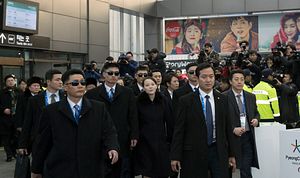With the arrival at PyeongChang of North Korean athletes and support staff (including the famous cheerleaders), and South Korea’s Unification Ministry statement that Kim Jong-un’s sister Kim Yo-jong will join North Korea’s delegation, the North Korea security risk factor at the Winter Olympics has quickly dissipated. The good news is, the Olympic détente between the Koreas allows us to tell clients attending the games that the likelihood of North Korean military exercises or rhetorical provocations during the games is greatly reduced. Attendees should enjoy what looks to be a successfully organized event that offers many safe things to do outside athletic competition.
Amid the usual inquiries from corporate clients about security risks at international gatherings, one of our clients called to ask what she should know about cultural faux pas risks should her corporate team meet North Koreans at either sporting or social events, which reminds us that despite the temporary reduction in hostilities, attendees should still keep in mind a few essential points about security and cultural differences.
Security Risks and Mitigation
Prior to the détente, we would have emphasized to attendees the potential for a disruption from North Korea given recent tensions and the precedent of the Flight 858 bombing in an attempt to sabotage the 1988 Seoul Summer Olympics. As with any large-scale event, terrorist violence, however unlikely, cannot be ruled out. The Islamic State has threatened U.S. military assets in South Korea and at least one radicalized South Korean has sought to fight for ISIS. Small protests might occur, as some South Koreans oppose the North’s participation, owing to the perception that the North has achieved a propaganda victory facilitated by the South’s government and paid for by the South’s taxpayers.
As with any terrorist attack or protest that turns violent, security and medical first responders’ response time must be rapid. South Korea’s military, police, and fire services are well trained and have emphasized this to foreign governments and the corporate world. A security incident is most dangerous in an indoor facility, though as recent vehicle terrorist incidents show, it is easier to attack the streets outside venues, which will also be the likely location of protests. We train clients to mentally prepare for the possibility of such incidents; at indoor venues know where the exits are, and outdoors resist the temptation to stand and observe an unfolding protest and police response. Rapid escape from an indoor incident, and departure from the scene of an outdoor one, are crucial. Recent tragic fires in South Korea are a reminder about fire risks at indoor venues, even in developed countries. On a more mundane note, a recent norovirus outbreak necessitates that visitors familiarize themselves with symptoms and prevention.
Don’t Mention Rockets, or Rocket Man
We expect North Korean attendees to be nervous and guarded due to the historic nature of their attendance. From my own visits to North Korea and experiences interacting with North Koreans in other forums, they are likely to be engaging with foreigners unless unnecessarily provoked. It is advisable to first initiate conversation with the most senior person in a group prior to interacting with others. That senior figure is often a male and, if not a coach, might be an officer in the North’s security apparatus. In the unlikely event that North Koreans raise sensitive issues such as their country’s nuclear ambitions and relations with the South, listen respectfully and avoid excessive comments or debates about who is responsible for historical or recent tensions.
Gifts in the form of small, nondescript items from foreign countries can create goodwill, though should not come across as charity or with a hint that it is a vital item North Korea lacks. The popular tradition of lapel pin exchanges at sporting events might mean the North Koreans bring pins to trade, but do not ask for pins with images of the Kim family, often worn by North Koreans. Limited internet access means most North Koreans might be unfamiliar with global popular culture, so a safe approach is to ask about their favorite musical group, which facilitates a conversation about Hyon Song-wol of the popular Morabong Band, who will lead the Olympic performance by the North’s Samjiyon Orchestra. Beer is a popular drink in North Korea, so proposing to continue the conversation over a mug can further break the ice.
When interacting with other delegations, not only should international disputes be avoided, but — specific to the Olympics — do not discuss embarrassing past Olympic sporting or financial results, or athletes banned for doping.
Have a Good Time, Prudence Always Applies
Although there’s no need to overdo security worries at the PyeongChang Olympics, common sense applies to personal safety and interactions with other attendees, whether corporate executives or athletes. The North’s attendance makes this Olympics more historic than others, and for those fortunate to meet North Korean delegation members, it is a chance to contribute to the détente, which will hopefully continue after the games.
Ross Darrell Feingold is Head of Business Development at SafePro Group, a consultancy that advises corporate clients about safety during security uncertainty and natural disasters around the world.

































